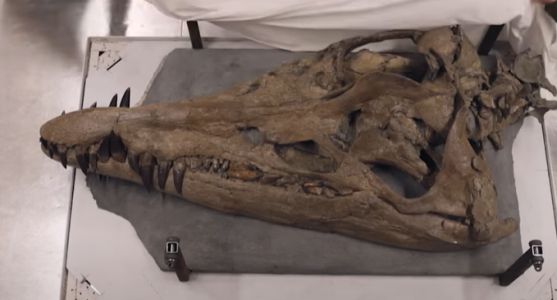 The BBC reports that the skull of a pliosaur, a colossal sea monster has been extracted from the cliffs of Dorset’s Jurassic Coast. The ferocious marine reptile terrorized the oceans about 150 million years ago. The 2m (6ft 5in)-long fossil is one of the most complete specimens of its type ever discovered and is giving new insights into this ancient predator. Researchers are analyzing the specimen to determine whether it could be a species new to science.
The BBC reports that the skull of a pliosaur, a colossal sea monster has been extracted from the cliffs of Dorset’s Jurassic Coast. The ferocious marine reptile terrorized the oceans about 150 million years ago. The 2m (6ft 5in)-long fossil is one of the most complete specimens of its type ever discovered and is giving new insights into this ancient predator. Researchers are analyzing the specimen to determine whether it could be a species new to science.
Originally spotted in spring 2022, the fossil, along with its complicated excavation and ongoing scientific investigation, are now detailed in the upcoming BBC documentary “Attenborough and the Jurassic Sea Monster,” presented by legendary naturalist Sir David Attenborough, that will air February 14 on PBS.
The fossil was buried deep in the cliff, about 11 meters (36 feet) above the ground and 15 meters (49 feet) down the cliff, local paleontologist Steve Etches, who helped uncover it, told CNN in a video call.
After using drones to map the cliff and identify the rest of the pliosaur’s precise position, Etches and his team embarked on a three-week operation, chiseling into the cliff while suspended in midair.
“It’s a miracle we got it out,” he said, “because we had one last day to get this thing out, which we did at 9:30 p.m.”
A short video describing the discovery and the perilous excavation:
Pliosaur discovery on Jurassic Coast is ‘very likely a new species’
Thanks to Alaric Bond for contributing to this post.
